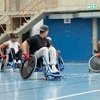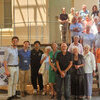Reshaping healthcare communication
21 May 2019 | Story Niémah Davids. Photo Michael Hammond. Read time 5 min.
The formation of the Patient Partner Programme, an innovative, multidisciplinary approach to addressing several gaps in the health sciences communication curriculum, has made significant headway with its “dynamic” approach to teaching and learning.
Spearheaded by the University of Cape Town’s (UCT) Dr Rachel Weiss, head of UCT’s Clinical Skills Centre, the programme has been funded by the Erasmus+ capacity building programme of the European Union, as part of the Caring Society 3.0 (CASO) consortium.
It seeks to respond to specific challenges in the South African context, by bridging the communication gap between healthcare professionals and their patients.
During a CASO Symposium in Cape Town recently, Weiss unpacked the Patient Partner Programme and offered delegates a comprehensive overview of its role and objectives. The programme explores authentic, patient-centred ways of teaching and learning communication in the health and welfare curricula.
The concept draws on higher education programmes that utilise standardised and simulated patients, as well as community-based programmes involving service users or peer support. “Patient partners” are viewed as “experts by experience”, with the project creating opportunities for them to participate in the design and implementation of communication training in the undergraduate health sciences curricula.
Weiss said the programme brings together three entities – laypeople, who include patients and/or caregivers, recruited for their “own lived experiences”; physiotherapy, nursing, social work and medical students; and academics from partner institutions in Europe and South Africa for an academic perspective.
“Nothing about us, without us; that is our motto and we [have established] a multidisciplinary, multi-professional team,” she said.
“Nothing about us, without us; that is our motto and we [have established] a multidisciplinary, multi-professional team.”
Weiss, who has a specific interest in patient-centred communication, said the way in which health professionals communicate has “huge potential for both depression and transformation”. And it’s for this reason that the programme seeks to create an adapted curriculum for healthcare students.
Producing curricula
According to Weiss, the programme has already produced “incredible curricula”, including two free-standing courses or modules on diversity, presented to staff and students in three different disciplines.
Relevant content on patient-centred communication has been developed and is already embedded in eight other courses, reaching hundreds of students across four universities on two continents.
“This is an incredible achievement,” she said.
Several massive open online courses (MOOCs) have also been established. She explained that these MOOCs drive the strategic objectives of the Patient Partner Programme and focus on various aspects of patient-centred communication, including learning through participation, and interpersonal communication skills.
To harness upskilling and development, some patient partners, like caregivers and patients, have been afforded the opportunity to become students themselves and to participate in a short course of their choice.
“We are extremely proud to have made these opportunities available. For us [at UCT], this is what it means to be a socially responsive academic institution,” Weiss said.
“We are extremely proud to have made these opportunities available. For us [at UCT], this is what it means to be a socially responsive academic institution.”
The full curriculum, which will be made available via a MOOC, is not yet open to students. But Weiss explained that aspects of it have been presented during a number of workshops. She said part of the plan is to introduce features of the modernised curriculum within the appropriate course contexts across all disciplines within health sciences.
Community effort
With the help of UCTʼs CASO partners, three health promotion projects have been implemented, which Weiss hopes will have a “longitudinal” impact on the community.
The initiatives straddle disability services, strokes and aging, and aim to equip the community with the key need-to-know facts on these three important health issues. In response, a community-based organisation that focuses on strokes has also been established in a bid to build awareness.
“[As our] SA partners will know, strokes have huge ramifications [on communities],” she said, adding that the programme has helped participants to gain insights and a deep cultural empathy for the world around them.
“We’ve gained a much deeper [understanding] of each other’s social and professional realities, and I am happy to say that we have a network that allows us to continue this work.”
 This work is licensed under a Creative Commons Attribution-NoDerivatives 4.0 International License.
This work is licensed under a Creative Commons Attribution-NoDerivatives 4.0 International License.
Please view the republishing articles page for more information.




























































































































































































































































































































































































































































